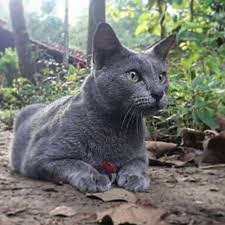
Raas Island
Conditions of detention
Raas Island cats are well-adapted to their natural environment on Raas Island but can adapt to various living conditions. They are active and enjoy having space to explore and play.
Useful Fact:
Raas Island cats are known for their independence and strong hunting instincts. They can be quite self-sufficient but also enjoy the companionship of their human families.
Nutrition and diet
The diet on Raas Island primarily consists of locally sourced food, including fresh fish, rice,
vegetables, and tropical fruits. Fishing is a significant part of the island’s economy, providing
a steady supply of seafood. Traditional dishes often feature grilled or fried fish, rice, and a
variety of fresh produce.
Useful Fact: The island’s reliance on locally grown and caught food promotes a diet rich in
natural, unprocessed ingredients, which is beneficial for overall health and sustainability.
Health
Healthcare on Raas Island is limited, with basic medical facilities available for primary care.
Serious health issues often require travel to larger islands or the mainland for treatment.
The local population typically relies on traditional medicine and herbal remedies alongside
conventional healthcare.
Useful Fact: The isolation of the island has helped maintain a lower incidence of some
infectious diseases, though it also limits access to advanced medical care and modern health
services.
Grooming and care
Personal grooming and hygiene on Raas Island are influenced by traditional practices, with
locals often using natural resources such as herbal baths and oils derived from native plants.
Regular bathing and hair care are part of daily routines.
Useful Fact: The use of natural products for grooming has been a part of the island’s culture
for generations, emphasizing sustainability and environmental responsibility.
Education and training
Educational opportunities on Raas Island are limited, with a few primary schools and
secondary education requiring travel to larger islands. Education often incorporates local
customs and practical skills such as fishing, agriculture, and traditional crafts.
Useful Fact: The education system places a strong emphasis on community values and the
preservation of cultural heritage, ensuring that children learn both academic subjects and
traditional knowledge.
Toys and entertainment
Children on Raas Island often play with handmade toys and engage in traditional games.
Entertainment for adults typically involves communal activities, such as music, dance, and
local festivals, which are integral to the island’s social life.
Useful Fact: The simplicity of the toys and games encourages creativity and physical activity,
fostering a strong sense of community among the island’s younger population.
Safety
Raas Island is generally a safe place with low crime rates. The close-knit community ensures
a high level of social cohesion and mutual support. Natural hazards such as storms and high
tides are more significant concerns, requiring residents to take precautions, particularly for
fishing activities.
Useful Fact: The island’s isolation contributes to its safety, with residents looking out for one
another and being vigilant about any unusual activities or potential dangers.
Accessories
Common accessories for daily life on Raas Island include traditional clothing made from
locally woven fabrics, handmade tools for fishing and agriculture, and simple household
items crafted from natural materials. These accessories reflect the island’s self-sufficient and
resourceful lifestyle.
Useful Fact: The use of locally made accessories helps support the island’s economy and
preserves traditional craftsmanship, promoting sustainability and cultural continuity.
Socialization
Social life on Raas Island revolves around community gatherings, religious events, and
traditional festivals. The strong sense of community ensures that socialization is a key part of
daily life, with an emphasis on family and communal activities.
Useful Fact: The island’s social structure promotes strong interpersonal relationships and a
collective approach to problem-solving, reinforcing the importance of community bonds.
Travel and Transportation
Transportation on Raas Island primarily involves walking or using small boats for fishing and
inter-island travel. The island has limited road infrastructure, and motorized vehicles are
rare. For longer journeys, residents rely on boats to reach larger islands or the mainland.
Useful Fact: The reliance on boats for transportation fosters a deep connection with the sea
and emphasizes the importance of maritime skills within the community.
Behavior and psychology
The residents of Raas Island have a strong sense of community and self-reliance, influenced
by their island lifestyle. Traditional values and respect for nature play a significant role in
shaping their behavior and attitudes.
Useful Fact: The island’s isolation and close-knit community create a supportive
environment that helps maintain mental well-being and a positive outlook among its
residents.
Legal aspects
Raas Island falls under the jurisdiction of Indonesia, and residents are subject to national
laws. Local customs and traditional practices also play a role in governing daily life. The
island’s relative isolation means that legal issues are typically handled within the community
or through local authorities.
Useful Fact: The combination of national law and local customs ensures that the legal
framework is adapted to the island’s unique social and cultural context, providing a balanced
approach to governance.


